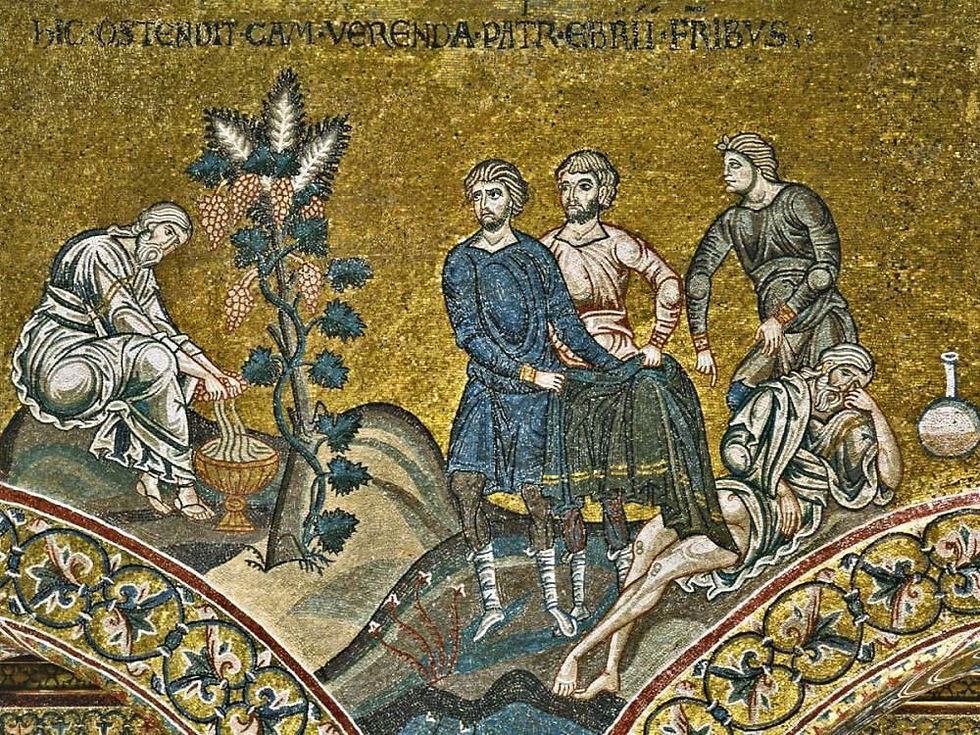Volk Auf Dem Weg: Ethnogenesis in the West
- Feb 4, 2021
- 3 min read

Having recently written about Russian and English ethnogenesis, it’s time to alight on what ethnicity meant in the medieval period. Mainly because its constant weaponisation (with rightists boiling it down to a rigid, stable biological entity, while leftists claim its political malleability reduces it to little more than a language game) is tedious. In reality ethnic factors were real but identities could be manipulated by mythologies, events, politics etc.
Perhaps a good place to start is the origin story of the Lombards as presented by the Origo gentis Langobardorum. It claimed a small people called the Winnili migrated from Scandinavia led by a wise woman called Gambara and her sons. They were eventually confronted by Vandals who solicited the help of Wodan. Gambara asked Freya for support and the goddess suggested the women wear their hair at the front so it looked like a beard and go down with their men to battle. When Woden asked on the battlefield who the Longobards were, Freya replied “It was you who have given them their name. Now give them victory.”
Usually self-mythologising like this would have been a rather insular fireside phenomenon, or at most neighbouring clans might know and dispute any claims. During the period of migrations, however, everybody’s backstory became front-page news as leagues of nations were tentatively drawn up. Isidore of Seville (d. 636) was one of the earliest movers and shakers on this front. Part of his Etymologies tried to explain the names of the peoples shuffling around the map (in the knowledge that names had power and that ethnonyms were the main building blocks of the world). Some were easy such as Longobard (long beards) and Alamanni (all or full men) but others could be misunderstood. Framing the Saxons as rocks, the Angli as angels, the Bulgars as vulgar or the Avars as greedy might suit a Latinate agenda but was ultimately farcical.
The main winners in the ruckus of migrations were clearly Germanics. They changed the map forever. Gaul became France, Liguria became Lombardy and Britain became England. Though latecomers were equally game-changing: Pannonia became Hungary, Thrace became Bulgaria, north-west Illyricum became Croatia. Only the Goths did not reign long enough to change the name of their regions – though even today Spain’s ethnogenesis tends to be traced back to these Germanics rather than the diverse peoples of the pre-Roman period (NB the crusades were an attempt to recover the Visigothic status quo ante rather than the Roman imperium).
Slavs too came into their own. Indeed, their name probably originated in Constantinople. The Germanics had only ever known them as barbarians until the Exarch of Ravenna informed Pope Gregory the Great that they were sklavoi (I think Prokopios first popularised the term) and it stuck. Indeed, the Eastern Romans were very good at trampling the grand claims of peoples who hit the West hard. The Avars they belittled as “pseudo-Avars,” for instance, and the Magyars were nothing more than uppity Turks.
Not that some of the older units didn’t remain. Italy, Spain, Britain and Greece/Hellas reminded folk of the older orders that refused to evaporate. Germania was still Germania (though peopled by Germans for the English, Allemands for the French, Tedeschi for the Italians and Nemci by Slavs). On a provincial scale, new powers would chop the map up at various periods into Castile, Provence, Lotharingia, the Netherlands, Switzerland and Austria. But some retained their permanence: Aquitaine, Tuscany, Dalmatia and Macedonia all lurked like grandmothers whose time in the attic bestowed the sheen of immortality rather than suffocated them in dust.
Finally, it’s worth noting that the mainframe was ultimately biblical. The postdiluvian world was divided into gentes according to their origins in the sons of Noah (Shem, Ham and Japheth) and their descendants who were clearly well travelled folk as they formed the progenitors of each ethnicity. The Romans had their own notions about being a people, however. Theirs was – at core – less ethnic in character. The populus was more of a political definition than an ethnic one. The Eastern Romans kept this older definition alive hence the lively contemporary debate on how much the Byzantines themselves considered themselves above the gentes or simply the first of the gentes.







Well, the Goths might have left a mark on the map, if the traditional etymology of Catalunya as Gotha-Launia (or the Byzantine one, a Goth-Alans condominium). And there is a remarkable, though unsurprising, continuity between the Roman regiones and modern Italian regional names: Liguria did not disappear, it rather went back to the smaller Augustan perimeter, while Venetia and Aemilia stood firm, and Imperial resilience in the Hexarchate gave us Romania-Romagna.